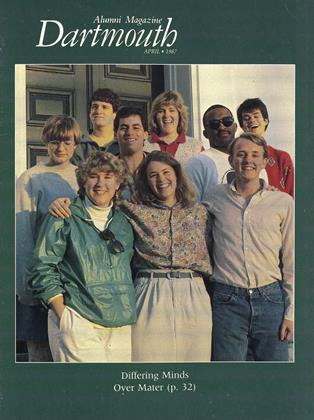3610 Oriole Drive Columbus, IN 47203
Following in the pattern of Rocky and Star Trek, our long-running series on anthropology majors in the class of '65 seems destined for reappearance. "Anthropology IV" is the creation of our classmate, Ned Greeley, who wrote the following from Bethesda, Md., in late November.
"In our senior year, Professor James Fernandez turned me on to anthropology and the study of social change in Africa. Following graduation, I found myself teaching secondary school with the Peace Corps in Eastern Nigeria. My stay in Africa was cut short when we volunteers in self-proclaimed Biafra were evacuated in the summer of 1967. From a personal view, the outbreak of the tragic civil war and the resulting departure had its compensation. I worked closely with another volunteer on the evacuation committee (buying food and supplies for 400 in a coastal market for the boat ride out of Biafra). That volunteer Monica and I celebrated our 17th wedding anniversary this year.
"Back in the States I taught a few years in an inner Washington D.G., high school (which also had its share of rapid social change and conflict, especially following the death of Martin Luther King Jr.). By that time I was ready to pick up what I'd left at Dartmouth: an interest in our topic, anthropology. By 1971, I had finished courses for a Ph.D. and was heading off to East Africa for field work. Following two years of teaching in Uganda (the Amin years of 1971-73), we moved with considerable relief next door to a quieter country and what turned out to be 11 sunny years in Kenya.
"First came the degree a study of traditional and modern family planning in the Kenya Highlands and then putting the anthropology of social change to work. Following some consultancies in population and development, I was initiated into the world of "development anthropology" working for the U.S. Agency for International Development. For an anthropologist interested in'social change, it was made to order. For five years I worked out of A.I.D.'s regional office in Nairobi as the region's behavioral science advisor. Traveling and working in 15 countries of East and Southern Africa, I helped ensure that A.I.D.'s investments took local cultural and institutional factors into account. When these are overlooked, development projects funded by external donors may never take off. My last three years in Kenya were spent working in A.l.D.'s Kenya office, designing and managing assistance projects in population, enterprise development, and renewableenergy.
"In 1984, 13 years after coming to East Africa, Monica and I returned to Washington with first-hand knowledge that happiness can indeed be found in cultures beyond the Connecticut River Valley (Monica having been raised in western Massachusetts). We and our two teenagers easily relate to the film Out of Africa.
"Monica, who left Nairobi as the secondary principal of Kenya's International School, is now working with the Office of Overseas Schools in the State Department. I'm still with A.1.D., working as the chief of the Policy Planning and Evaluation Division in the Development Planning Office of the Africa Bureau. There are a very few anthropologists in the bureau, and though development work requires cross-cultural understanding, we tend to do less anthropology as we move into management positions. It is noteworthy, however, that approximately 500 (20 percent) of all A.I.D. officers have had Peace Corps experience.
"This case of the Dartmouth history major who became an anthropologist should help expand future inquiries into other categories. I'll be looking forward to the next columns, and to more cases within and beyond anthropology. Themes such as this are a good way to get us to correspond."
Thanks for adding yourself to our list, Ned. Are there any others?
 View Full Issue
View Full Issue
More From This Issue
-
 Feature
FeatureFor the Love of Dal Bat
April 1987 By Thomas J. Frazer '82 -
 Cover Story
Cover StoryShould The College Change Its Tune?
April 1987 By Jay Heinrichs -
 Feature
FeatureWish You Were Here
April 1987 By Marshall Ledger '61 -
 Feature
FeatureThe Debate Over Safe Sex Lands Dartmouth on "Donahue"
April 1987 By Lee Michaelides -
 Cover Story
Cover StoryALL TOGETHER NOW ...
April 1987 -
 Article
ArticleRobert Kaiser '39: Economic expertise is his planned gift to Dartmouth
April 1987 By Deborah Hodges
Bruce Jolly
Class Notes
-
 Class Notes
Class NotesLOCAL ASSOCIATIONS
August, 1914 -
 Class Notes
Class Notes1917
OCTOBER 1964 By DONALD BROOKS, VICTOR C. SMITH -
 Class Notes
Class NotesCLASS OF 1898
February 1921 By James R. Chandler -
 Class Notes
Class Notes1961
OCTOBER 1988 By Robert Conn -
 Class Notes
Class Notes1948
MARCH 1973 By SAMUEL A. WILKINSON, PETER F. FOSTER -
 Class Notes
Class Notes1905*
March 1942 By WALTER M. MAY








